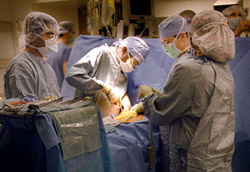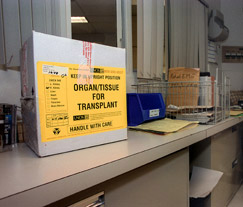|
|
|
Department of Medical History and Ethics Enlarges Offerings
|
|
 |
|
|
The emergence of transplant surgery posed the ethical question of fair distribution of donated organs.
|
|
|
|
|
|
|
After several rounds of cancer treatment, a patient is diagnosed with widely metastatic disease. When a life-threatening disease is no longer amenable to treatment, how do the goals of health care change? When does preserving the patient’s quality of life and improving comfort become more important than attempting an elusive cure? The Department of Medical History and Ethics helps medical students, residents, researchers and physicians address difficult situations when medicine does not have a simple solution.
“Medicine is not just sewing up a cut,” said Dr. Wylie Burke, professor and chair of medical history and ethics. “We know what we want medicine to accomplish, and that is a return to health when an individual is ill. However, when you look at the implications of some treatments and of biomedical research, many ambiguities arise. This is where medical ethics steps in.”
Traditionally the Department of Medical History and Ethics has concentrated on scholarly research and teaching students in the first two years of medical school. The department is expanding its programs to include empirical research. It s also branching out into clinical ethics education tailored to specific residency programs.
“We’re also going to expand our teaching into the clinical setting to explore teaching on hospital wards,” said Burke.
“We see our role as developing a basic ethics curriculum and adapting it to a variety of clinical settings,” she added. “If I could forecast where we’re headed, I’d say that research ethics also seem like an extremely important area.”
 |
|
|
A new delivery for transplantation. Regional cooperation results in more effective use of available organs.
|
|
|
|
|
|
|
The Department of Medical History and Ethics provides scientists-in-training with the principles of research ethics through monthly Biomedical Research Integrity lectures. This series, associated with faculty-led small group discussions, covers topics identified by the National Institutes of Health as relevant to the responsible conduct of research. These areas include informed consent, data acquisition, peer review and mentor/trainee relationships.
Burke and her colleagues have found that ethics comes more naturally to students and residents alike in the context of familiar, real-world situations. The seven faculty members in medical history and ethics are always trolling for faculty members in other departments who are interested in leading ethics discussions. UW clinicians and scientists are invaluable assets in lending their expertise to develop case studies, teaching points, and learning objectives relevant to their research field or clinical specialty.
“When you talk to medical students and residents about ethics by using cases that they recognize, they have a far greater, more intuitive understanding than if you use abstract ethical reasoning,” said Burke. “One of our exciting collaborations this year was with the Department of Urology. Dr. Paul Lange, the chair of urology, has provided strong support for medical ethics teaching. He has scheduled time for us to address his residents in their regularly scheduled didactic sessions.”
In working with the Department of Medicine, faculty members from Medical History and Ethics participate with residents in discharge planning, hospital rounds, and ethics teaching sessions. Similarly Dr. Douglas Diekema, associate professor of pediatrics and adjunct associate professor of medical history and ethics, has designed an innovative clinical ethics program for pediatric residents. Diekema, whose office is at Children’s Hospital and Regional Medical Center, presents monthly case study discussions and an interactive program on specific ethical issues in pediatrics.
At the Veterans Affairs Puget Sound Health Care System, Dr. Anthony Back, assistant professor of medicine in the Division of Oncology and adjunct faculty in medical history and ethics, is the primary investigator on Oncotalk, a project funded by the National Cancer Institute. Oncotalk trains oncology fellows on communication skills and on helping patients make difficult decisions about treatment options and quality of life.
“The fundamental goal of health care is to help people who are sick or injured,” said Dr. Wylie Burke, professor and chair of medical history and ethics. “Health care is a calling that seeks to do good for people. Our department helps health-care professionals think through tough medical situations, to try to figure out exactly what the good is and how best to accomplish it.”
|













